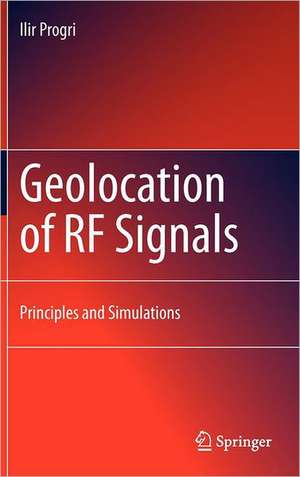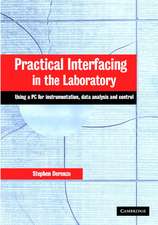Geolocation of RF Signals: Principles and Simulations
Autor Ilir Progrien Limba Engleză Hardback – 24 ian 2011
Drawing upon years of practical experience and using numerous examples and illustrative applications, Ilir Progri provides a comprehensive introduction to Geolocation of RF Signals, and includes hands-on real world labs and applications using MATLAB in the areas of: RF signals specifications, RF geolocation distributed wireless communications networks and RF geolocation.
Geolocation of RF Signals—Principles and Simulations will be of interest to government agency program managers industry professionals and engineers, academic researchers, faculty and graduate students who are interested in or currently designing, developing and deploying innovative geolocation of RF Signal systems.
| Toate formatele și edițiile | Preț | Express |
|---|---|---|
| Paperback (1) | 946.87 lei 6-8 săpt. | |
| Springer – 25 noi 2014 | 946.87 lei 6-8 săpt. | |
| Hardback (1) | 953.03 lei 6-8 săpt. | |
| Springer – 24 ian 2011 | 953.03 lei 6-8 săpt. |
Preț: 953.03 lei
Preț vechi: 1162.23 lei
-18% Nou
Puncte Express: 1430
Preț estimativ în valută:
182.37€ • 189.17$ • 152.07£
182.37€ • 189.17$ • 152.07£
Carte tipărită la comandă
Livrare economică 27 martie-10 aprilie
Preluare comenzi: 021 569.72.76
Specificații
ISBN-13: 9781441979513
ISBN-10: 1441979514
Pagini: 450
Ilustrații: XIV, 330 p.
Dimensiuni: 155 x 235 x 32 mm
Greutate: 0.66 kg
Ediția:2011
Editura: Springer
Colecția Springer
Locul publicării:New York, NY, United States
ISBN-10: 1441979514
Pagini: 450
Ilustrații: XIV, 330 p.
Dimensiuni: 155 x 235 x 32 mm
Greutate: 0.66 kg
Ediția:2011
Editura: Springer
Colecția Springer
Locul publicării:New York, NY, United States
Public țintă
ResearchCuprins
Introduction to Geolocation of RF Signals.- Requirements for Description of Geolocation of RF Signals Systems.- RF Signals.- Adaptive Array Algorithms for Geolocation of RF Signals.- Recursive Algorithms for Adaptive Array Systems.- Adaptive Array Beamforming for Interference Mitigation for GRFS Systems.
Recenzii
Aus den Rezensionen:
“… Ilir Progri präsentiert in diesem Buch die technische, signalbezogene Seite der Geolocation. … Positiv ist die Präsentation der aktuellen Situation und der Entwicklungen in den spezifischen Forschungsgebieten – mit zahlreichen Literaturangaben, die ein Vertiefen ermöglichen. Spezialisten, die sich einen Überblick über Geolocation-HF-Signale und die zu ihrer Auswertung benötigten (mathematisch anspruchsvollen) Algorithmen verschaffen möchten, werden in diesem Buch eine willkommene Quelle finden.“ (in: Bulletin SEV/VSE, 7/October/2011, Issue 10, S. 68)
“… Ilir Progri präsentiert in diesem Buch die technische, signalbezogene Seite der Geolocation. … Positiv ist die Präsentation der aktuellen Situation und der Entwicklungen in den spezifischen Forschungsgebieten – mit zahlreichen Literaturangaben, die ein Vertiefen ermöglichen. Spezialisten, die sich einen Überblick über Geolocation-HF-Signale und die zu ihrer Auswertung benötigten (mathematisch anspruchsvollen) Algorithmen verschaffen möchten, werden in diesem Buch eine willkommene Quelle finden.“ (in: Bulletin SEV/VSE, 7/October/2011, Issue 10, S. 68)
Textul de pe ultima copertă
Geolocation of RF Signals—Principles and Simulations offers an overview of the best practices and innovative techniques in the art and science of geolocation over the last twenty years. It covers all research and development aspects including theoretical analysis, RF signals, geolocation techniques, key block diagrams, and practical principle simulation examples in the frequency band from 100 MHz to 18 GHz or even 60 GHz. Starting with RF signals, the book progressively examines various signal bands – such as VLF, LF, MF, HF, VHF, UHF, L, S, C, X, Ku, and, K and the corresponding geolocation requirements per band and per application – to achieve required performance objectives of up to 0º precision. Part II follows a step-by-step approach of RF geolocation techniques and concludes with notes on state-of-the-art geolocation designs as well as advanced features found in signal generator instruments.
Drawing upon years of practical experience and using numerous examples and illustrative applications, Ilir Progri provides a comprehensive introduction to Geolocation of RF Signals, and includes hands-on real world labs and applications using MATLAB in the areas of: RF signals specifications, RF geolocation distributed wireless communications networks and RF geolocation.
Geolocation of RF Signals—Principles and Simulations will be of interest to government agency program managers industry professionals and engineers, academic researchers, faculty and graduate students who are interested in or currently designing, developing and deploying innovative geolocation of RF Signal systems.
Drawing upon years of practical experience and using numerous examples and illustrative applications, Ilir Progri provides a comprehensive introduction to Geolocation of RF Signals, and includes hands-on real world labs and applications using MATLAB in the areas of: RF signals specifications, RF geolocation distributed wireless communications networks and RF geolocation.
Geolocation of RF Signals—Principles and Simulations will be of interest to government agency program managers industry professionals and engineers, academic researchers, faculty and graduate students who are interested in or currently designing, developing and deploying innovative geolocation of RF Signal systems.
Caracteristici
Provides a comprehensive introduction to Geolocation of RF Signals Explains and analyzes blind adaptive signal processing, digital beam-forming, array signal processing; and geolocation, as well as detection, and estimation techniques Describes multipath processing in geolocation of RF signals Includes hands -on real world labs and applications using MATLAB in the areas of: RF signals specifications, RF geolocation distributed wireless communications networks and RF geolocation
Includes supplementary material: sn.pub/extras
Includes supplementary material: sn.pub/extras












